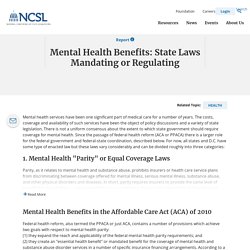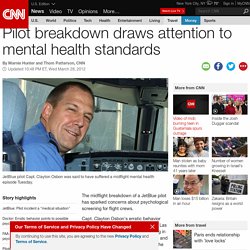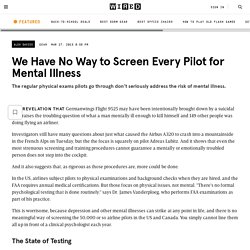

How Changing One Habit Helped Quintuple Alcoa's Income - Business Insider. The American Institute of Stress. “People are disturbed not by a thing, but by their perception of a thing.”

Epictetus Definitions: Stress:There has been no definition of stress that everyone accepts. Cost/Benefit Research. 160889NCJRS.pdf. Seven facts about America’s mental health-care system. In the wake of the Newtown school massacre, many have called for a stronger mental health safety net as one way to reduce violent shootings.

Shooters in previous massacres had unmet mental health needs. By widening access to services, the thinking goes, professionals could intervene before a tragedy occurs. The mental health-care system in the United States is a multibillion-dollar industry that is still not big enough to serve all those who need it. Costs are a big barrier to treatments -- but so are attitudes about mental health. New laws might change access to mental health, although significant barriers still remain. Mental-health-benefits-state-mandates. Updated: April 2015 Mental health services have been one significant part of medical care for a number of years.

The costs, coverage and availability of such services have been the object of policy discussions and a variety of state legislation. There is not a uniform consensus about the extent to which state government should require coverage for mental health. Since the passage of federal health reform (PPACA) there is a larger role for the federal government and federal-state coordination, described below. Does Your Insurance Cover Mental Health Services? What does the law do?

The federal parity law requires insurance companies to treat mental and behavioral health and substance use disorder coverage equal to (or better than) medical/surgical coverage. That means that insurers must treat financial requirements equally. For example, an insurance company can't charge a $40 copay for office visits to a mental health professional such as a psychologist if it only charges a $20 copay for most medical/surgical office visits. The parity law also covers non-financial treatment limits. For instance, limits on the number of mental health visits allowed in a year were once common. What health plans does the law affect?
The federal parity law generally applies to the following types of health insurance: Some other government plans and programs remain exempt from the parity law. How are airline pilots tested for mental health? Pilot breakdown draws attention to mental health standards. The midflight breakdown of a JetBlue pilot has sparked concerns about psychological screening for flight crews.

Capt. Clayton Osbon's erratic behavior prompted Flight 191 from New York to Las Vegas to make an unscheduled landing in Amarillo, Texas, on Tuesday after crew and passengers intervened and subdued the 49-year-old pilot. Osbon "yelled jumbled comments about Jesus, September 11th, Iraq, Iran,and terrorists," according to a federal criminal complaint filed against Osbon. One passenger quoted Osbon as saying, "Pray f------ now for Jesus Christ," the complaint said. "It just seemed like something triggered him to go off the wall. JetBlue pilot charged with interfering with flight crew.
We Have No Way to Screen Every Pilot for Mental Illness. The revelation that Germanwings Flight 9525 may have been intentionally brought down by a suicidal pilot raises the troubling question of what a man mentally ill enough to kill himself and 149 other people was doing flying an airliner.

Investigators still have many questions about just what caused the Airbus A320 to crash into a mountainside in the French Alps on Tuesday, but the the focus is squarely on pilot Adreas Lubitz. And it shows that even the most strenuous screening and training procedures cannot guarantee a mentally or emotionally troubled person does not step into the cockpit. And it also suggests that, as rigorous as those procedures are, more could be done.
In the US, airlines subject pilots to physical examinations and background checks when they are hired, and the FAA requires annual medical certifications. But those focus on physical issues, not mental. Dangerous Times: When Paranoids Do Politics. Writing in European Neurology, the historian Juerg Kesselring says that Stalin met all the clinical standards for paranoia: Excessive sensitivity to rejection; bearing on slights, suspicion; tendency to distort experiences; neutral or friendly actions of others misinterpreted as hostile or contemptuous; unjustified suspicions regarding sexual fidelity of spouse or sexual partner; contentious and continued insistence on their own rights; inflated self-esteem and frequent, excessive self-absorption.

The psychiatrists J. Lieb and J.D. Hershman have done a careful study of other murderous dictators. They conclude that Napoleon, Hitler, Stalin, and Kaiser Wilhelm were manic depressives with paranoia. Which brings me to some truly crazy folks in Europe today. Doctor and Patient: When the Doctor Has Epilepsy. Johnny Quirin/Spectrum HealthDr.

Brien Smith discusses next steps with Douglas Davis, a patient at Spectrum Health Butterworth Hospital in Grand Rapids, Mich. One day during medical school, my classmates and I learned that one of the most well-liked doctors-in-training in the hospital had had a seizure while leading morning work rounds. The sight of him writhing had caused the other doctors and nurses on the ward to panic. Some stood mute, frozen with fear. An intern, believing that the seizure arose from low blood sugar levels, took his half-eaten jelly doughnut and held it against the mouth of his seizing colleague. The young doctor eventually recovered. For the last 20 years, Dr. History of Psychology: The Making of a Science - Edward Kardas.